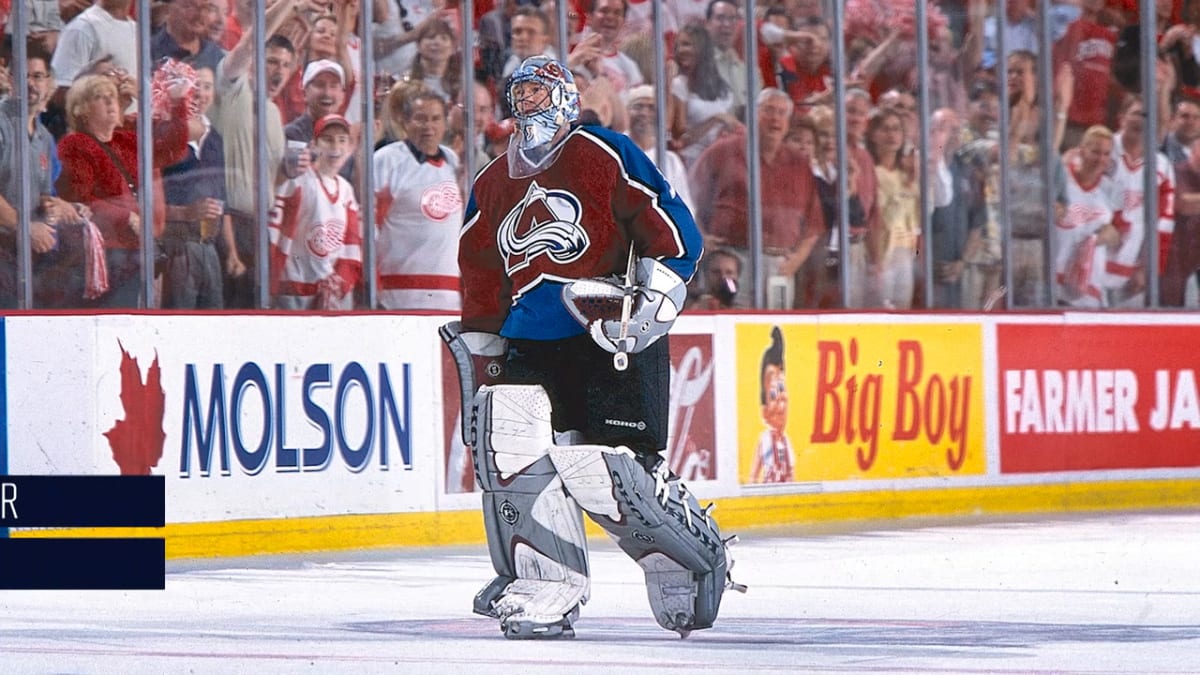Hall of Fame goaltender Patrick Roy, the league leader in career playoff games played (247) and career playoff wins (151), played in his final NHL game on April 22, 2003.
One of the best goaltenders in NHL history took the net one final time 17 years ago today.
On April 22, 2003, Patrick Roy‘s 19-year NHL career came to an end after a Game 7 overtime loss to the Minnesota Wild in the first round of the playoffs. Roy, who popularized the “butterfly style” of goaltending, holds league records for career playoff games played (247) and career playoff wins (151).
At 37 years old, Roy left the NHL as a four-time Stanley Cup winner and six-time All-Star team member. His accolades include five William M. Jennings trophies for allowing the fewest regular-season goals, three Conn Smythe awards—an NHL record—as the most valuable playoff member and three Vezina trophies as the best goaltender, as voted by general managers.
Roy earned the nickname “St. Patrick” after his first Stanley Cup victory in 1986. The win followed Roy’s first full NHL season, during which he was named the team’s starting goalie and recorded a 15-5 postseason record on the way to the team’s title. His efforts led him to the NHL All-Rookie team and his first Conn Smythe trophy. He became the youngest to win the award in league history at 20 years old.
As the star of the Canadiens, he led the league in save percentage in four of the following six seasons as the team reached the playoffs in each, including a loss in the Stanley Cup finals in 1989.
Roy reached his second championship with Montreal in 1993, when he tied an NHL record with an 11-game playoff winning streak. After the Canadiens finished third in the division and went down 2-0 in the first round against the Quebec Nordiques, Roy responded to criticism by leading his team to four straight victories. He followed it up with a sweep of the next round and winning the first three games of the conference finals. Over the course of the postseason, Roy set a record of ten straight playoff overtime victories, including three against the Los Angeles Kings in the finals.
After over 11 seasons in Montreal, Roy’s time with the Canadiens ended in a clash. The league’s top goalie was suspended and subsequently traded to the Avalanche on Dec. 6, 1995 after the Canadiens’ new coach, Mario Tremblay, took his time to pull Roy out of a blowout. Tremblay waited until Roy had allowed nine goals before taking him out of the game, and after the goalie skated to the bench and exchanged glares with his coach, he told Canadien president Ronald Corey, “This is my last game for Montreal.”
It was a stunning exit for a player that was 23 wins away from breaking Jacques Plante’s goaltending record in Montreal. Furthermore, the trade became known as one of the most lopsided in NHL history. Tensions between Roy and Tremblay were seemingly unreconcilable.
Roy, a Quebec native, joined the Avalanche after the team’s move from his hometown—and the newly-relocated franchise quickly found success. In 1996, Colorado won its first Stanley Cup and Roy won his third behind three postseason shutouts.
In 2001, Roy won his fourth and final Stanley Cup after a seven-game series with the New Jersey Devils. Roy helped the Avalanche outlast 28-year-old goalie Martin Brodeur, who went on to surpass Roy in career victories, games played and saves.
Two seasons later, Roy played his final NHL game as the Avalanche fell in the conference quarterfinals. The all-time great announced his retirement on May 28, 2003, and was later inducted into the Hockey Hall of Fame on Nov. 13, 2006. His No. 33 is retired by both Montreal and Colorado, becoming the sixth NHL player to have his number retired by separate franchises.
Roy returned to the Avalanche as head coach and vice president of hockey operations in 2013 before stepping down in the 2016 offseason, citing philosophical differences.



















